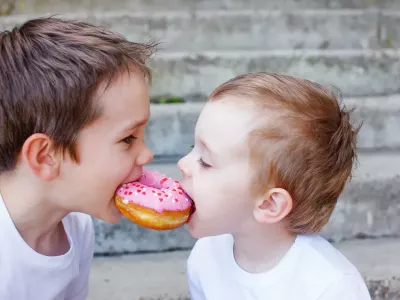How To Prevent The "Facebook-friend-frenzy" Hurting Your Kids

Your child could have 10 friends on Facebook or 10,000 followers on Instagram – either way they are probably being judged by their peers according to their so-called social media popularity.
Worryingly, there are signs that collecting as many friends and followers as possible is becoming stressful for some teenagers as they strive to compete with other adolescents.
It's mostly about gaining status - whoever can collect the most is seen as being the coolest – and that's important to teenagers.
In some ways, this competitiveness is nothing new. Since the earliest days of human evolution, many of us have been willing to work hard to achieve high status. At its most basic level, this is about competing with our peers. High status provides many advantages, especially increased access to scarce resources. Back then these resources were food, shelter and protection. Now that these resources are mostly not so scarce, we compete for other things.
Think back to the olden days (of the 1990s!) before we let the world wide web into our homes; kids used to collect sports cards with pictures of famous figures, or stamps, or CDs or records of favourite rock stars. It often took time and money to collect these and there was often a finite number on offer! Nowadays, there's such easy access to mobile devices that the number of 'friends' that can be collected seems virtually infinite. But collecting friends can still take up a lot of time and energy – time and energy that could usually be put to better use.
So what does this all mean for your teenager? And how can you help your teenager be part of this virtual world, yet not be crushed by it?
There are really two main issues for parents to think about here.
1. Need to monitor devices and restrict access
- As they develop, teenagers need a certain amount of physical activity and face-to-face human contact. Emerging research indicates that increased screen time directly impacts on obesity (it increases with more screen time) and social skills (they decrease with more screen time).
- So while I'm not saying "all screen time is bad", a balance needs to be struck, so teenagers stay healthy, active and don't lose the ability to communicate well with others.
2. Teach teens what real friendships are
- Parents should take on some responsibility for educating their teenagers about the nature of friendship. Friends are people who make time to be with us, who are interested in some of the same things that we are interested in, and who care about us. We share things with them, learn things from them, and look forward to being with them. Many of the people our teenagers refer to as 'friends' do not meet these criteria – many of them are contacts and nothing more. Some may even be friends of friends, who your teenager may have never met and may never meet. Some may be acquaintances, and even may be "real life" friends (or have the potential to become friends) but that will take time and investment on both sides.
- If parents can help their teenagers make this distinction, and recognise the competitive 'collecting' element that is so common, they may find that their teenager is less inclined to measure their self-worth by the number of followers they can manage to collect – and perhaps even see it as just a bit of fun.
Both of these initiatives require parents to be committed to keep communicating well with their teenager/s. Good communication channels allow these important kinds of conversations to take place in an environment of care and support, not at times when parents are worried or stressed. Put in this effort and you'll see the dividends in many other ways as your teenager develops toward adulthood. You may even end up being best of friends one day...

